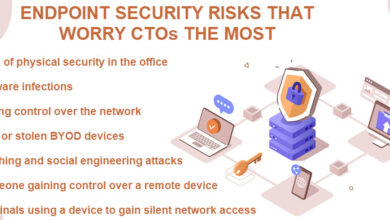
Government Cyber Security Careers A Deep Dive
Government cyber security careers offer a thrilling blend of intellectual challenge and public service. Protecting critical infrastructure and sensitive data from increasingly sophisticated threats requires a diverse skillset and unwavering dedication. This field isn’t just about coding; it’s about strategy, collaboration, and a deep understanding of the ever-evolving digital landscape. From entry-level analysts to seasoned security architects, there’s a path for everyone passionate about safeguarding our nation’s digital assets.
This post explores the diverse roles within government cybersecurity, the required skills and qualifications, the hiring process, and the ethical considerations involved. We’ll also examine the salaries and benefits, compare them to the private sector, and delve into the future trends shaping this crucial field. Whether you’re a seasoned professional or just starting your cybersecurity journey, this guide provides valuable insights into a rewarding and impactful career path.
Required Skills and Qualifications
Landing a government cybersecurity job requires a potent blend of technical prowess and interpersonal skills. It’s not just about knowing how to stop a cyberattack; it’s about collaborating effectively with colleagues and communicating complex technical issues to non-technical stakeholders. This section delves into the essential skills and qualifications needed to thrive in this critical field.
Essential Technical Skills
Government cybersecurity roles demand a deep understanding of various technologies and security principles. Proficiency in network security is paramount, encompassing firewall management, intrusion detection/prevention systems (IDS/IPS), and vulnerability scanning. A strong grasp of cryptography, including encryption algorithms and key management, is equally crucial for protecting sensitive data. Incident response skills are vital, requiring the ability to quickly identify, contain, and remediate security breaches.
Furthermore, experience with security information and event management (SIEM) systems and security auditing is highly valuable. Specific areas of expertise may vary depending on the agency and the specific role, but a solid foundation in these core areas is essential.
The Importance of Soft Skills
While technical skills are undeniably important, soft skills are equally crucial for success in government cybersecurity. Effective communication is paramount, as you’ll need to explain complex technical issues to both technical and non-technical audiences. This includes the ability to clearly articulate risks, propose solutions, and collaborate with diverse teams. Teamwork is essential, as cybersecurity is rarely a solo endeavor.
Collaboration with colleagues, other agencies, and even private sector partners is often necessary to address complex threats. Problem-solving skills are critical for identifying and mitigating security risks, while adaptability is essential in a constantly evolving threat landscape. Finally, strong ethical considerations and a commitment to upholding the highest standards of integrity are vital in a field dealing with sensitive government information.
Educational Pathways
A strong educational foundation is a cornerstone for a successful career in government cybersecurity. A bachelor’s degree in computer science, cybersecurity, information technology, or a related field is often a minimum requirement. Many positions prefer candidates with a master’s degree, especially those involving more advanced roles or specialized areas like cryptography or digital forensics. Furthermore, relevant certifications demonstrate practical expertise and commitment to the field.
Continuing education and professional development are crucial, as the cybersecurity landscape is constantly changing.
Relevant Certifications
Possessing relevant certifications significantly enhances your candidacy for government cybersecurity positions. These certifications validate your expertise and demonstrate your commitment to professional development. Here are some examples:
- Certified Information Systems Security Professional (CISSP)
- Certified Ethical Hacker (CEH)
- CompTIA Security+
- GIAC Security Essentials (GSEC)
- Certified Cloud Security Professional (CCSP)
Obtaining these, or similar, certifications showcases your dedication to staying current with best practices and emerging threats. The specific certifications valued by a given agency might vary, so it’s always beneficial to research the requirements for specific job postings.
Government Agencies and Their Cybersecurity Needs
The cybersecurity landscape is constantly evolving, and government agencies, at all levels, face increasingly sophisticated threats. Protecting sensitive data, critical infrastructure, and national security requires robust cybersecurity departments and collaborative efforts across agencies. Understanding the unique challenges and responsibilities of different government entities is crucial for building a resilient and secure nation.
Examples of Government Agencies with Significant Cybersecurity Departments
Several federal agencies possess substantial cybersecurity departments dedicated to protecting their own operations and contributing to national cybersecurity. The Department of Homeland Security (DHS), for instance, plays a pivotal role in national cybersecurity through its Cybersecurity and Infrastructure Security Agency (CISA). The National Security Agency (NSA) focuses on signals intelligence and cybersecurity related to national defense, while the Federal Bureau of Investigation (FBI) investigates cybercrime and works to disrupt malicious actors.
These agencies, along with others like the Department of Defense (DoD), contribute to a layered approach to national cybersecurity.
Cybersecurity Challenges Faced by Different Government Agencies
Government agencies at the local, state, and federal levels face distinct cybersecurity challenges. Federal agencies often handle highly sensitive national security information, making them prime targets for sophisticated state-sponsored attacks and advanced persistent threats (APTs). State agencies may face attacks targeting voter registration databases or other sensitive citizen information. Local governments, with often limited resources, can be vulnerable to ransomware attacks and other forms of cybercrime that disrupt essential services.
The scale and sophistication of attacks vary significantly depending on the agency’s size, resources, and the sensitivity of the data they handle.
Specific Cybersecurity Responsibilities of Example Agencies
CISA within DHS focuses on risk management, incident response, and coordinating cybersecurity efforts across the nation. They provide guidance, tools, and resources to both public and private sector organizations. The NSA’s cybersecurity efforts center on protecting national security systems and developing advanced cybersecurity technologies. The FBI investigates cybercrimes, tracks down perpetrators, and works to disrupt cybercriminal networks. Each agency’s specific responsibilities are tailored to its mission and the types of threats it faces.
Hypothetical Cybersecurity Incident and Collaborative Response
Imagine a coordinated ransomware attack targeting multiple state election systems just weeks before a major election. The FBI would likely lead the investigation into the perpetrators, attempting to identify them and disrupt their operations. CISA would work to coordinate incident response across affected states, providing technical assistance and guidance on data recovery and system restoration. State agencies would be responsible for their own immediate response, while sharing information with federal agencies to support the broader investigation and prevent future attacks.
This collaborative effort highlights the importance of information sharing and coordinated response in mitigating the impact of large-scale cybersecurity incidents.
The Hiring Process and Application Strategies

Landing a government cybersecurity job is a rewarding but competitive endeavor. The process is rigorous, emphasizing both technical skills and a commitment to national security. Understanding the intricacies of the hiring process and tailoring your application accordingly is crucial for success. This section Artikels the typical steps involved and offers strategies to improve your chances.
Government Cybersecurity Job Application Procedures
The application process for government cybersecurity positions typically begins with submitting an application through the USAJOBS website (or a similar agency-specific platform). This involves creating a profile, uploading your resume and cover letter, and completing any questionnaires or assessments required. Many positions will also require you to answer specific questions related to the job description. After submitting your application, it will be reviewed by a hiring manager and potentially screened by an automated system.
If your application is deemed suitable, you will be contacted for an interview. The interview process may consist of multiple rounds, involving technical assessments, panel interviews, and background checks.
Resume and Cover Letter Strategies
Crafting a compelling resume and cover letter is paramount. Your resume should be concise, highlighting your relevant skills and experience using s found in the job description. Quantify your accomplishments whenever possible – instead of stating “Improved network security,” say “Reduced network vulnerabilities by 25% through the implementation of X security measure.” Your cover letter should personalize your application, explaining why you’re interested in the specific position and agency, and how your skills and experience align with their needs.
Consider tailoring your resume and cover letter for each position you apply for to maximize your impact. Using a consistent format and clear, concise language is crucial.
Security Clearances and Background Checks
Security clearances and background checks are a significant part of the government hiring process. The level of clearance required will vary depending on the sensitivity of the position. Expect thorough background investigations, including credit checks, criminal history checks, and interviews with references. It’s crucial to be honest and transparent throughout this process; any inconsistencies or omissions can disqualify you.
The process can take several months, so patience is key. For example, a Top Secret clearance can take a year or more to obtain.
Showcasing Relevant Experience and Skills
Effectively showcasing your experience and skills requires strategic application of s and quantifiable achievements. Use the STAR method (Situation, Task, Action, Result) to describe your accomplishments. For example, instead of simply listing “Experience with intrusion detection systems,” describe a specific situation where you used an IDS to identify and mitigate a security threat, outlining the task, your actions, and the positive results.
Remember to tailor your descriptions to match the specific requirements and responsibilities Artikeld in the job description. Highlighting projects involving similar technologies or security challenges as those faced by the government agency will demonstrate your readiness for the role.
Salaries and Benefits
Choosing a career in government cybersecurity offers a unique blend of public service and professional fulfillment. However, a crucial aspect to consider is the compensation package – encompassing salary and benefits. Understanding the financial aspects is key to making an informed career decision. This section will explore salary ranges, benefits packages, and comparisons with the private sector.Government cybersecurity salaries vary significantly based on factors like experience level, specific role, location, and the employing agency.
Entry-level positions might start around $60,000 annually, while experienced professionals with specialized skills and clearances can earn well over $150,000. Location also plays a significant role; major metropolitan areas with high costs of living tend to offer higher salaries to attract and retain talent. For example, a cybersecurity analyst in Washington D.C. might command a higher salary than a similar role in a smaller city.
Government Cybersecurity Salary Ranges by Experience
Entry-level positions typically involve assisting senior analysts, performing basic security tasks, and gaining experience in the field. Mid-level roles often involve leading projects, mentoring junior staff, and specializing in a particular area (e.g., incident response, threat intelligence). Senior-level positions involve strategic planning, managing teams, and advising leadership on cybersecurity matters. The following table provides a general overview, keeping in mind that actual salaries can vary widely.
| Experience Level | Salary Range (USD) | Notes |
|---|---|---|
| Entry-Level | $60,000 – $85,000 | Requires a bachelor’s degree and may require specific certifications. |
| Mid-Level | $90,000 – $130,000 | Requires several years of experience and advanced certifications. |
| Senior-Level | $120,000 – $180,000+ | Requires extensive experience, leadership skills, and advanced certifications. May require a Master’s degree. |
Government Benefits Packages
Beyond salary, government cybersecurity positions often come with comprehensive benefits packages that are highly competitive. These typically include:
- Health Insurance: Government employees usually have access to affordable and comprehensive health insurance plans, often with options for different levels of coverage.
- Retirement Plans: Government employees often contribute to a retirement plan, such as the Federal Employees Retirement System (FERS) or the Thrift Savings Plan (TSP), which offer significant matching contributions from the government.
- Paid Time Off: Government employees generally receive generous amounts of paid vacation, sick leave, and holidays.
- Life Insurance: Many government agencies offer life insurance benefits to their employees.
- Disability Insurance: Government employees often have access to disability insurance to protect them in case of illness or injury.
The specifics of these benefits can vary depending on the agency and the employee’s position.
Comparison with Private Sector Salaries
Salaries in the private sector for cybersecurity professionals can be significantly higher, particularly at the senior levels. However, government positions often offer a better work-life balance, stronger job security, and a comprehensive benefits package that can offset the potential salary difference. The private sector might offer more opportunities for rapid advancement and higher bonuses, but the trade-off is often increased pressure and less job security.
Salary and Benefits Across Different Government Agencies, Government cyber security careers
Salary and benefits can vary between agencies, reflecting differences in mission, budget, and location. For example, agencies like the NSA or CISA, dealing with high-stakes national security issues, might offer higher salaries to attract top talent. The following table provides a simplified comparison; actual figures can fluctuate.
| Agency | Typical Salary Range (USD) | Notable Benefits |
|---|---|---|
| NSA | $80,000 – $200,000+ | Top-tier security clearance, generous retirement plan, relocation assistance. |
| CISA | $75,000 – $175,000+ | Focus on critical infrastructure protection, opportunities for national impact. |
| DHS | $70,000 – $160,000+ | Broad range of cybersecurity roles, opportunities for professional development. |
| FBI | $70,000 – $150,000+ | Focus on law enforcement and investigations, opportunities for specialized training. |
Ethical Considerations in Government Cybersecurity
Government cybersecurity professionals operate in a unique and challenging ethical landscape. They are entrusted with protecting sensitive national security information, citizen data, and critical infrastructure, all while navigating complex legal frameworks and potential conflicts of interest. Maintaining the highest ethical standards is not just a matter of professional responsibility; it’s crucial for maintaining public trust and ensuring national security.The ethical dilemmas faced by government cybersecurity professionals are multifaceted and often require careful consideration.
Balancing the need for robust security measures with the protection of individual privacy rights is a constant challenge. Similarly, navigating the complexities of national security interests against international cooperation and legal obligations presents significant ethical considerations. The potential for abuse of power and the temptation to overstep legal boundaries are ever-present risks that require vigilance and a strong ethical compass.
Legal and Ethical Guidelines in Government Cybersecurity
Adherence to established legal and ethical guidelines is paramount in government cybersecurity. These guidelines, often codified in laws, regulations, and agency policies, provide a framework for responsible conduct. Examples include the Privacy Act of 1974, which protects the privacy of individuals’ personal information held by government agencies, and the Computer Fraud and Abuse Act, which addresses unauthorized access to computer systems.
Furthermore, professional codes of ethics, such as those offered by organizations like the (ISC)² and ISACA, provide guidance on responsible behavior and ethical decision-making in the cybersecurity field. Compliance with these guidelines is not merely a suggestion; it is a legal and professional obligation.
Consequences of Violating Cybersecurity Ethics
Violating cybersecurity ethics in a government context can have severe consequences, ranging from disciplinary action to criminal prosecution. Depending on the severity and nature of the violation, penalties can include fines, imprisonment, damage to reputation, and loss of security clearance. Moreover, breaches of ethical conduct can undermine public trust in government institutions, leading to decreased cooperation and hindering the effectiveness of national security efforts.
For example, a leak of classified information due to negligence or malicious intent could have devastating consequences for national security, potentially jeopardizing lives and undermining international relations. The consequences extend beyond individual repercussions to encompass significant societal and national security implications.
Ethical Decision-Making Scenarios
Government cybersecurity professionals regularly encounter scenarios that require careful ethical consideration. One example involves responding to a suspected insider threat. While investigating the threat, professionals must balance the need to protect national security with the individual’s rights to due process and privacy. Another example is deciding whether to utilize a potentially invasive surveillance technology to prevent a cyberattack.
This decision requires weighing the benefits of enhanced security against the potential infringement on individual privacy rights. Finally, a professional might face a dilemma where they discover a vulnerability in a critical government system. They must decide whether to immediately report the vulnerability, potentially risking exploitation before a patch can be implemented, or to prioritize fixing the vulnerability before disclosure, potentially delaying the mitigation of the risk.
Each scenario necessitates a thorough ethical assessment and a decision that aligns with both legal and moral principles.
Future Trends in Government Cybersecurity: Government Cyber Security Careers

Government cybersecurity is a constantly evolving landscape, shaped by the relentless innovation in technology and the equally relentless adaptation of malicious actors. Understanding future trends is crucial for agencies to proactively defend against emerging threats and effectively leverage new technologies to enhance their security posture. This section explores key trends impacting the field.
Emerging Cybersecurity Threats and Challenges
Government agencies face a growing array of sophisticated and persistent cyber threats. These include advanced persistent threats (APTs), which are characterized by their long-term nature and ability to evade detection; supply chain attacks, targeting vulnerabilities in third-party software or hardware; and increasingly sophisticated ransomware attacks, often targeting critical infrastructure. The rise of deepfakes and other forms of AI-powered disinformation poses a significant threat to national security and public trust.
Furthermore, the increasing interconnectedness of systems through the Internet of Things (IoT) creates a larger attack surface, exposing agencies to a wider range of vulnerabilities. The challenge lies not only in detecting and responding to these threats, but also in adapting to the ever-changing tactics, techniques, and procedures (TTPs) employed by adversaries. For example, the SolarWinds attack highlighted the vulnerability of supply chains, impacting numerous government agencies and demonstrating the devastating consequences of such breaches.
The Role of Artificial Intelligence and Machine Learning in Government Cybersecurity
AI and ML are rapidly transforming government cybersecurity. These technologies offer the potential to automate many aspects of cybersecurity, such as threat detection, incident response, and vulnerability management. AI-powered systems can analyze vast amounts of data to identify patterns and anomalies that might indicate malicious activity, significantly improving the speed and accuracy of threat detection. Machine learning algorithms can be trained to recognize and respond to specific types of attacks, adapting to new threats as they emerge.
For example, AI can be used to analyze network traffic in real-time, identifying suspicious patterns and automatically blocking malicious connections. However, the use of AI in cybersecurity also presents challenges, including the potential for adversarial attacks against AI systems and the need for robust data governance and ethical considerations.
The Impact of New Technologies on Government Cybersecurity Strategies
Cloud computing, IoT, and 5G are transforming the way government agencies operate, but they also introduce new cybersecurity challenges. The migration of sensitive data to the cloud requires robust security controls to protect data in transit and at rest. The proliferation of IoT devices creates a massive attack surface, requiring agencies to develop effective strategies for securing these devices and the data they collect.
The deployment of 5G networks presents both opportunities and risks, requiring agencies to address security concerns related to network infrastructure and data privacy. For instance, the increased reliance on cloud services necessitates a shift from perimeter-based security to a more cloud-native approach, emphasizing identity and access management and data encryption. The widespread adoption of IoT devices in critical infrastructure, such as smart grids and transportation systems, requires careful consideration of security vulnerabilities and potential risks.
Projected Future Trends in Government Cybersecurity: A Visual Representation
The visual representation would be a dynamic infographic. The central element is a network graph, showing interconnected nodes representing government agencies, critical infrastructure, and various technologies (cloud, IoT, 5G). Lines connecting these nodes represent data flows and interdependencies. The thickness of the lines would vary based on the volume of data flow, with thicker lines indicating higher risk areas.
Color-coding would highlight different levels of cybersecurity risk: green for low risk, yellow for medium risk, and red for high risk. Arrows pointing towards nodes would illustrate potential attack vectors. Overlaid on the graph would be animated icons representing emerging threats (e.g., ransomware, APTs, deepfakes) moving across the network, highlighting their impact on different nodes. The infographic would also include a timeline showing the projected growth of AI/ML adoption in government cybersecurity, alongside projected increases in cyberattacks and the evolution of threat actors’ techniques.
A key would clearly define the meaning of each color, icon, and line thickness. This visual representation would dynamically illustrate the interconnectedness of government systems, the evolving threat landscape, and the role of emerging technologies in shaping future cybersecurity strategies.
Concluding Remarks
Securing our nation’s digital infrastructure is a critical mission, and government cyber security careers offer a unique opportunity to contribute directly to this vital effort. From protecting citizens’ data to safeguarding national security, the work is challenging, rewarding, and constantly evolving. The path to a successful career in this field requires dedication, continuous learning, and a commitment to ethical practices.
So, if you’re drawn to a career that blends technology, strategy, and public service, exploring government cybersecurity is a path worth considering. The need is great, and the impact is immeasurable.
Expert Answers
What is the typical work-life balance in government cybersecurity?
Work-life balance varies depending on the agency, role, and current threat level. While some positions may require long hours during critical incidents, many offer a more traditional work schedule.
Are there opportunities for advancement within government cybersecurity?
Yes, there are significant opportunities for career progression. Many agencies offer robust training and development programs, allowing professionals to advance to leadership roles.
How important is a security clearance for government cybersecurity jobs?
A security clearance is often a requirement for many government cybersecurity positions, particularly those involving sensitive information or systems.
What are the long-term career prospects in government cybersecurity?
Long-term prospects are excellent. The demand for skilled cybersecurity professionals continues to grow, making it a stable and in-demand career path.





